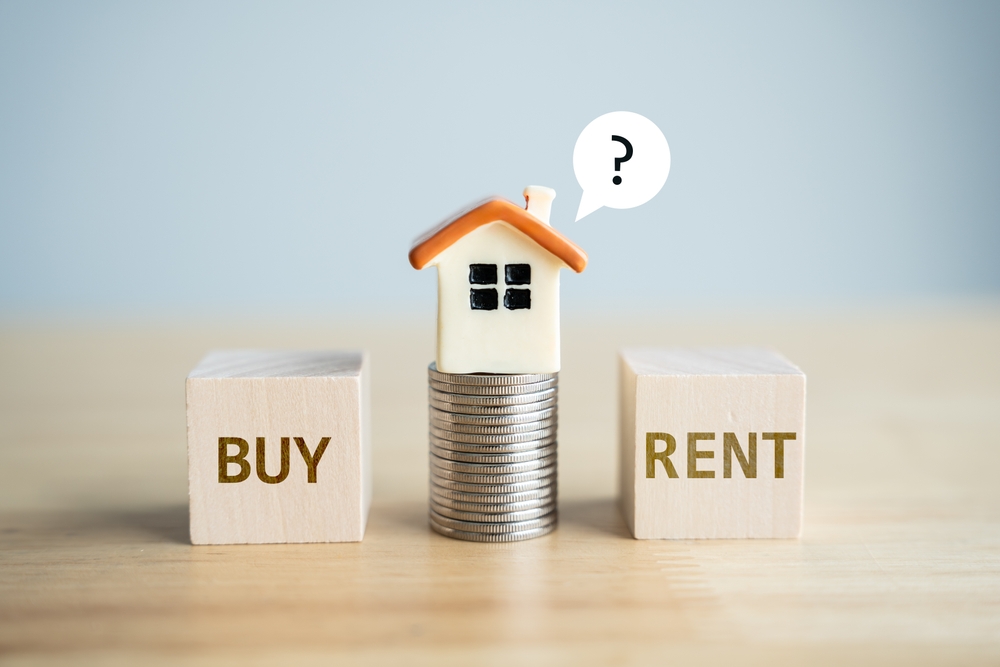The decision to rent or buy a home is often one of the most significant financial commitments you’ll make in your lifetime. The choice between these options is not just about where you’ll reside but plays a critical role in determining your financial future, lifestyle, and sense of stability. Each option comes with its own set of benefits and drawbacks, which can vary depending on personal circumstances, market conditions, and long-term goals.
Pros of Renting
- Flexibility: Renting offers the freedom to move without the burden of selling a property. This is ideal for those who anticipate job changes, enjoy exploring different neighborhoods, or aren’t ready to settle down.
- Lower Upfront Costs: Typically, renting requires less financial commitment upfront, often limited to first and last month’s rent plus a security deposit. This is significantly less than the down payment and closing costs associated with buying a home.
- Maintenance and Repair Costs: Tenants are often not responsible for major repairs and maintenance, such as fixing a leaking roof or a broken furnace. This responsibility usually falls on the landlord, offering tenants peace of mind and financial relief.
- Access to Amenities: Many rental properties, especially in apartment complexes, offer access to amenities like gyms, pools, and community rooms without extra costs, contributing to an enhanced lifestyle.
- No Market Risk: Renters are insulated from fluctuations in the housing market, which means they won’t lose money if property values decline.
Cons of Renting
- Lack of Equity: Renters do not build equity in a property, meaning their monthly rental payments do not contribute to long-term wealth.
- Rent Increases: Rent prices can increase over time, often annually. Tenants may find themselves paying significantly more over the years without increased value or equity.
- Limited Personalization: Tenants often face restrictions on altering or personalizing their space. Changes like painting or renovations typically require landlord approval.
- Lack of Stability: Rental agreements are subject to renewal terms, and tenants may be asked to vacate the property at the end of a lease term if the landlord decides not to renew.
Pros of Buying
- Building Equity: Homeowners build equity over time as they pay down their mortgage, which is a form of forced savings and wealth accumulation.
- Stable Housing Costs: With a fixed-rate mortgage, homeowners can have predictable monthly payments, unlike rent, which can increase over time.
- Freedom to Personalize: Owning a home provides the freedom to modify the property as desired without seeking permission from a landlord. From significant renovations to minor decorative changes, homeowners have complete control.
- Potential Tax Benefits: Homeowners might qualify for various tax deductions, including mortgage interest and property taxes, reducing their annual taxable income.
- Potential Appreciation: Real estate tends to appreciate over time, which can add to your net worth. While the market can fluctuate, holding a property long-term generally results in capital gains.
Cons of Buying
- High Upfront Costs: Buying a home requires a significant financial commitment upfront, including a down payment, closing costs, and various fees and taxes.
- Maintenance Responsibilities: Homeowners are responsible for all repairs and maintenance, which can be both time-consuming and costly. A broken appliance or a leaky roof becomes the homeowner’s issue to resolve.
- Market Risk: Home values can decrease due to market downturns, which means homeowners might owe more on their mortgage than the property is worth if they need to sell.
- Lack of Flexibility: Selling a home can be a lengthy and costly process, reducing mobility for those who need to relocate for work or personal reasons.
- Additional Expenses: Buying a home comes with several ongoing expenses that do not apply to renters, including property taxes, homeowners insurance, and sometimes HOA fees.
Considering Personal Circumstances
Deciding whether to rent or buy also heavily depends on individual circumstances:
- Stability of Income: Individuals with a stable and sufficient income may feel more comfortable taking on a mortgage, while those with variable income might prefer renting.
- Credit Score: A good credit score is essential for securing favorable mortgage terms. Individuals with poor credit may find renting a more viable short-term option.
- Future Plans: If you plan to stay in one place for several years, buying might make more financial sense. However, if you foresee changes in your personal or professional life, renting could offer the needed flexibility.
Market Conditions
The decision to rent or buy should also be informed by the current state of the real estate market:
- Interest Rates: Low interest rates can make buying a home more affordable, lowering monthly mortgage payments and lifetime interest costs.
- Housing Prices: If housing prices are on the rise, buying sooner rather than later might be advantageous. Conversely, if a market appears to be in a bubble, renting could be the smarter financial move.
- Rental Market: In some cities, rental prices might be so high that buying becomes the more cost-effective option. In other areas with lower rental costs, renting might be more advantageous.
The decision to rent or buy is intensely personal and should be made based on a combination of financial readiness, lifestyle preferences, and long-term goals. While renting offers flexibility and lower initial costs, buying provides equity building and potential tax benefits. Evaluating your financial situation, market conditions, and personal preferences can guide you to make a decision that aligns with both your immediate needs and future ambitions. Ultimately, the best choice is one that supports both your financial wellbeing and your lifestyle aspirations.



